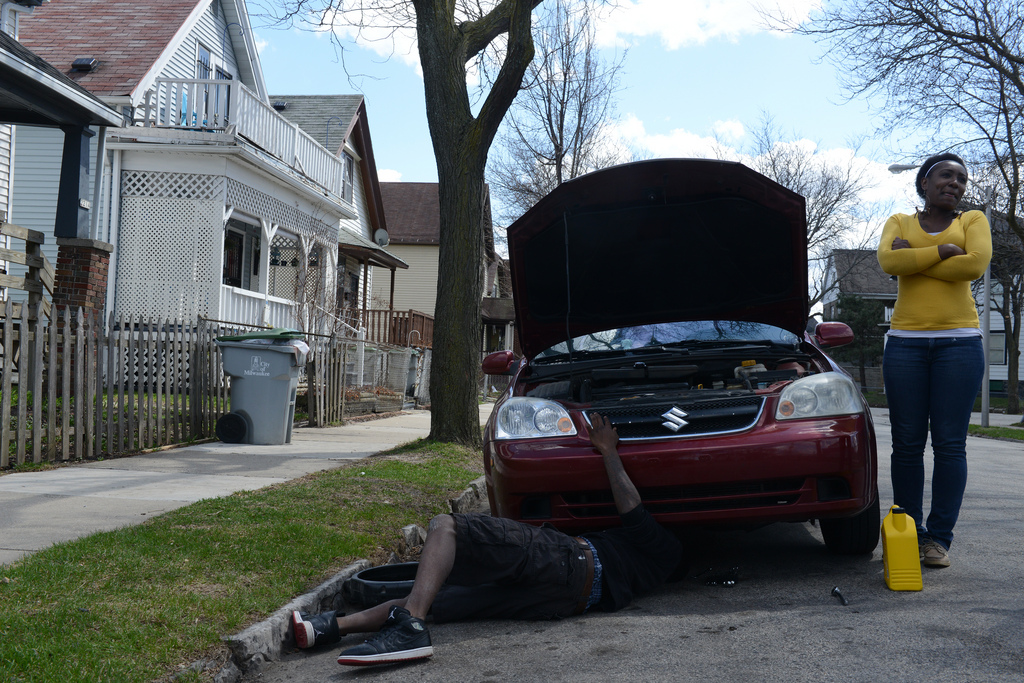Central City Relies on Street Mechanics
Auto owners often get cheap repairs from free-lance mechanics.

Mitchell Aaron performs auto maintenance on Michelle Taylor’s maroon Suzuki sedan. (Photo by Sue Vliet)
Smoke rose from underneath the hood as a faint stench of burnt oil came from the Buick Regal.
It was 1:30 p.m. on a sunny Saturday. Sequoia Raymond, sporting camouflage high heels, was headed out to celebrate her 22nd birthday over lunch with friends and family when she began to smell the ominous “tar burning” odor of car trouble.
“It’s a downfall. This ruins my life,” said Raymond, who dreaded the prospect of public transportation, especially after a trusted relative recently replaced the brakes and a water pump.
But rather than calling a tow truck or a service repair shop, which would have emptied her already light pocketbook, the health care worker dialed Erik Hill, a close friend and laid-off mechanic.
Within a few moments, Hill arrived near the corner of 34th Street and North Avenue and had his head under the teal sedan’s hood, casually pointing to engine parts with a lit cigarette between his right index and middle fingers.
“Your radiator is busted,” Hill said emphatically as the conversation with Raymond quickly turned to planning the necessary fix.
Similar scenes depicting arrangements between poor central-city car owners and street mechanics trying to make ends meet played themselves out over the next hour within a 2-mile radius. For car owners, these arrangements mean much less expensive auto repairs and maintenance compared to what it would cost in a repair shop or auto dealership. For the street mechanic, they mean income.
“It saves you a lot of money when you can fix your own car versus taking it into the shop,” Hill said. “I charge, but I don’t charge an arm and a leg for doing the work.”
Savvy street mechanics, like Hill, keep a close eye on what Milwaukee repair shops are charging for labor — generally from $80 to $90 an hour — making sure their prices are much less. They also take advantage of free estimates and diagnostic work offered by repair shops. Once they learn what is wrong with the vehicle, they buy the parts and repair it on their own.
Street mechanic waits
Five minutes later at the corner of 25th Street and North Avenue, a freckled out-of-work mechanic sat against a brick wall on a bag of tools and his coat. The 57-year-old, who had just landed a repair job through word of mouth, was waiting at the AutoZone, 2475 W. North Ave., for a customer to arrive with his vehicle.
“I got to eat. I have to work. I have no other choice, that’s my skill,” said Rick, 57, who asked that his last name not be published.
Rick’s oil-blackened hands are crippled from debilitating arthritis.
“No matter how bad I hurt, I still got to come out here and make money,” he said. Rick has been denied Social Security disability benefits.
Rick planned to inspect the car and then have the owner buy the parts inside the store. He would charge his going rate, about $50 or $60, for his labor. A warranty, guarantee or receipt does not come along with these types of street deals, just a handshake and the mechanic’s word, he said.
The work can be “dangerous and stressful,” Rick said. A fellow mechanic recently got “cut up so bad he almost died” and a few months ago Rick got into his own treacherous situation, he said.
“The kid pulled off with the hood still up on the car down the street so he could keep from frickin’ paying me,” Rick said. “Sometimes out here on the street, you can’t defuse the situation and it becomes a life-threatening matter.”
The young car owner turned thief stiffed Rick the $40 he charged in labor to fix a 1998 Saturn and another $45 for a small part, a job that would have cost hundreds of dollars at a repair shop.
Rick did not give chase.
“If I chased him and he had an accident, that’s on my conscious,” he said. “I still would like my money, but it wasn’t worth putting his life in danger. I did the right thing.”
Street mechanics also have to watch for the police as it is against the law to fix or maintain motor vehicles on Milwaukee streets. If caught, they risk a fine up to $100.
“They don’t want any money moving that they don’t get tax on,” Rick said. “So it’s illegal to work on the street and it’s illegal to work in your garage that you own. It’s still a good ole’ boys system.”
Reliable service from a friend
As Rick waited seven blocks to the west, two legs in shorts stuck out from underneath Michelle Taylor’s maroon Suzuki sedan as rhythmic rap music rang from a nearby house in the 2200 block of North 18th Street.
The oil and filter change would have cost from $30 to $100 down the street at an auto repair shop, but the man who attended to the vehicle, Mitchell Aaron, 20, charged only a few dollars for the supplies. The labor was free for his friend.
“The money means a lot. With where gas prices are in the city, it means a whole lot,” said Taylor, an unemployed 25-year-old, whose job prospects multiply by having a reliable automobile.
Taylor trusted Aaron to do routine maintenance better than an auto mechanic that she has never met, noting that when she goes into a shop, she is one of many competing for the mechanic’s time and attention.
“This is my baby. It’s nice to know someone who knows what they are doing,” Taylor said.
Must remain mobile
At 2:30 p.m., the rapping of a metal wrench onto a steel part echoed against a nearby brick wall at the corner of Center and 35th streets. Kendale Coats was on his knees, trying to remove a broken part from near the brake on the driver’s side front wheel of his silver 1994 Chrysler LHS.
The repair, if he took it to a shop, would have cost about $1,000, money that he could not imagine having, let alone spending on his automobile. Instead, the 50-year-old Coats, who has been repairing cars since he was 15, went to a local junkyard where he bought the part for $70.
Time was of the essence for Coats. He needed to complete the repair before Monday, when he was due back at work loading and unloading trucks at a Mequon company, where he makes $12 an hour.
“They don’t have a bus out there, so I have to have a vehicle to get to work,” said Coats, who keeps a pile of tools and an orange traffic cone in his trunk just in case his car breaks down while on the road.
This story was originally published by Milwaukee Neighborhood News Service, where you can find other stories reporting on fifteen city neighborhoods in Milwaukee.























The Beat reporting is great for on-the-spot messaging of activities and nuisances and nuances in the neighborhoods. However, I think the titles should not be so widespread (Central City Relies on Street Mechanics) as this blog title does. It is indicating that all or a great majority of individuals in City Center Milwaukee are so desperate for auto technicians that they are taking to the curb-only services. Not true.
It does share the negatives in safety and riskiness of “Curb Mechanicing”.
It tells for example why taxpayer Kendale Coates and so many other individuals should have the public option of transportation to and from Mequon.
Lastly, when there is such broadbrushing, the takeway of the negatives outweigh the positives and result in stereotyping stakeholders of City Center Milwaukee. It would of been of good note to report why they were not working at some of the local auto repair shops. There are many shops that are not asking the prices mentioned in this piece for service. There are also auto repair shops that are looking to hire reliable and competent mechanics.
Mary Glass – Milwaukee Professionals Association LLC